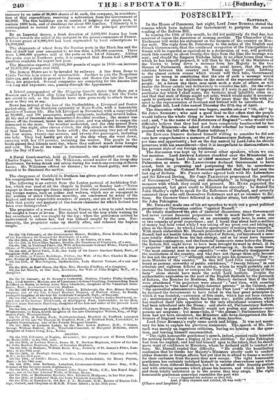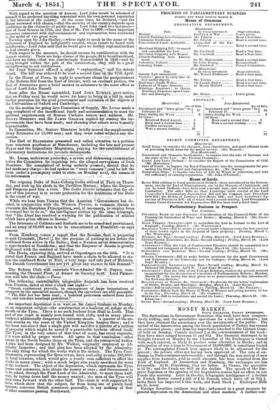POSTSCRIPT.
SATURDAY.
In the House of Commons; last night, Lord Sons: Ritessm, stated the reasons which have induced . the • Government to postpone the second reading of the Reform Bill„ In naming the 13th of this month, he did not positively. fix that day, but reserved of course the discretion of naming another. Th. Chancellor of the Exchequer will make his statement on the firatileis of the country on Mon- day next. The reply from St. Petersburg to the notice of the English and French Governments,-that the continued occupation of the Principalities by Russia will be regarded,as equivalent to a declaratione. seer, will probably reach this country in about twenty-five days titan, the-tiMejlie message was sent; and should the Emperor Nicholas Eaten to 'no,Olkeeiterms than those which he has himself proposed, it will'then be theeetsg eit.the Ministers of the Crown to -bring down a message from her Meterty to the two Houses of Parliament, declaring, in . the usual terma;, that Act . pacific, relations between . this ,Cenntry and Russia no longer : exie,t looking to the almost certain course whicheventif 'will then hike, 'Government cannot be wrong in fiensidering that the eve alt message would hardly be the time to deliberate on the state-of the representation of the people. At a future day there may. exist mash. a Mate. of affairs as will enable the House calmly and deliberately to consider the bill. On the other hand, "it would be thelieight of impredence if I were to pay that upon that particular day ivhicli I shall nani,e-the , bitsine'ss must coine on ; and that that state.of things mirr not'arise,Which would reeks it necessary again to postpone it to-a-future ?' ' In the time the 'hills with re- spect to the representation of Scot and and Ireland -will' be bitrodeced. For the English bill; Lordlohn named Thursday the .27th,day of April.
The discussion which ensued.was begun,' amidst cries of i4.0h, oh!" by Sir Rens &amaze ;. who said a good desist:I-Uinta/A that the people would believe the whole. thing to have been.-1 shinninam beginning to end ; and, " in the name til the-Reformers-of Englance's—whewould with difficulty believe that they had not been completely bamboozled -bylier Majesty's Ministers-;-he asked Lord !Johirwhethose heifeally.meant to proceed with thebilLafter the-Easter holidays it. 000,z,s 7,, • • • Sir Dwain) BERING declared himself willing to consider he did not care hoar comprehensive n 113848U111, Of ParliernentarasiReforre, sat the pro- per time and opportunity.; .but on the dey, istune,d; by_Lord.Tohn _he should perseverewitli hie anaelatjthellt+—that it is ukwedimottuAimanif.xni in the present state of our foreigniniefiffne. The discussion was kept up by several other': speakers, whom we can but mention. • Lord-Antwen Listvienz chnelded- over the' Ministerial re- treat ; describing. Lord John astlelfiet Mourner for Reform, and Lord Palmerston as mute. Mis.LanotlemeArt declared Geternment to have acted, both in proposing and postponing the bill; in accordance with public- fearing: LColonel fhontoinrisredieted thatIthey had seen the last rag of Reform. Mr. Pumas rather agreed both with Mr. Labonchere and Sir Edward Hering.. Sir Jose's PaatisAtosi pronounced the position of Government'" humiliating and disCreditable," in bringing forward a measure wi,th Which they could not proceed. Mr. Ilumz,regretted the postponement, but gave credit to Ministers for sincerity : • he denied' John Shelley's right to alma for the Reformers or England, and severely censured those who call themselves Reformers and act as enemies to, her form.. Sir Grolon GREY followed inn sizailaritreln, but chiefly against
Sir John Pakington. - • • .
Mr. Demur:it made oneof his set speeches to work out a great political proposition—a Cieerenian oration "against Russell." He totally diselloweetthe plea of &nettle.' discussions' since Government had never carried financial propositions witislim -much facility as in this session. "I attended yesterday; at all unnseally .early hour, to make one' or two remarks-et:great importance; awl 1 feantl ,tha$ t)bout of money had been voted while I was taking off my great coat and taking my . place in the House • by which I lost the opportunity of making those remarks. With Much elaboration Mr. Disineli proceeded to set forth; that as lord John Russell had not hastily taken up thesubject of Reform, yet introduced a Meas sure totally different from his last attempt, and as he must have foreseen ' the Russian contingency, and the financial businesato consebeforethe House, the Reform Bill ought never to have been brought forward in detail, it its " projector " did not nee a fair prospect.of,advancing it. In the mean time; "the most eminent man in our assembly "—who "evciweily disapp/oves-ef e institutions of the country, and who does not change_ them otlif-,bacause he Ma not the power "—" al .940 unable ts-pass tekt.TeAsWes;, I alma re-
main Minister of this country." this Mil Lord Jan endeavotired seto
brand as persona unworthy of psb/in: OanklfinetS7 ."Af•senty on0. schedule and eighteen fellows in another,„whom he would prebably askto increase the Liceine-tax- or reimpose the Soap-duty. `Ile wisdom of these facts" alone should have made the noble Lord hesitate. Despite the authoritative4mptessionon the part Of the English-Ibidieiffihy the patriarch of Reform, the Member for Montrose, Mr. Disraeli declared that if the bill were abandoned "its- projectors were abased " - and then, with sneering compliments to "the band of highly-talented patriots" in the Cabinet, and - " the- unrivalled administrative abilities of the First Lord" of the Admiralty, he declared the Government to have failed iia.the four great principles on- which it was founded,-,extension of free trade; which hes not been extend- ed; inailitenaSse Of peace, which has'becanie war-, . iniblic;eduCtition, which' has resolved itself into opposition to the only eslacaliOnalmeasiire which had been introduced into the House;- and aboVe-all,'Pairliamentary Before), which may be passed—Mr. Disraeli would not -prefees.ansi opinion—some persons are sanguine; but meanwhile, if "the Parliamentary Re- form had not been circulated,. the Ministate who bantelisappointed the Re- formers of England WOuls1 not be,eittipg on thesehenehesi- • Lord 'Toms Resew r'.8 reply came quiels end-biting It was not neces- sary for him to explain his previous statement. .Tho,Speech of Mr. Dis- raeli was merely an ingenious criticism; having no bearing on the ques- tion, and leaving himself uncommitted. " The right, honourable gentleman's speech, indeed, seem-ed really intended for nothing further than a display of its own abilities. ,Sir Jahn Pakingten had been too explicit; and had hull himself open to the retort,That he should move want of confidence in Ministers, whom lie declared unfit to-conduct af- fairs. Mr. Disraeli evaded that difficulty. "Ho avoids the humiliating. confession that lie thinks her Majesty's Ministers utterly unfit to oandact either domestic or foreign affairs,' but -yet that be is afraid to frame a motion. for their exclusion from the posts they now weepy. The right honourable gentleman has certainly indulged himself in.vanous observations upon what has fallen from different Members, but he is satisfied with framing periods and with uttering sarcasms which Please his hearers, and which leave him and them totally unfettered as to the course they may adopt. The right honourable gentleman somewhat resembles the pet who • — faggoted his notions as they fell. And, if they rhymed and rattled, all was well.", (Cheers and laughter.)
House answered with clieeps,.-that the security of the country depends upon confidence in the character of public men. Lord John cited two instances— himself if he preferred anythOig iminected with Wm bwn..personal reputation to the interest of the country. At the same time he declared,—and the that of Lord Smilers in 1706, and that of Mr. Pitt in1800—where important measures connected with disfranchisement and represention were conducted With regard to the question .01 laonour, ,Lord John :would be ashamed of in the midst of two great want. Turning upon Sir John Shelley,—whose right to speakin the name of the Reformers of England be indignantly scouted, whose taunts he heard with iudifference,—Lord John said that he would give no further explanation than he had already given.
With respect to the measure, he should resunie its consideration with the deepest anxiety. There are large classes of the People, fit to be enfranchised, who have no 74:des—that was convincingly deinonstrated in 1818—and by being brought 'within the pale of the constitution, they will be a great strengthening to our institutions. Sir JOHN SBELLEY offered a slight " explanation)", and the debate closed. The bill was Ordered to he-feed-a-second tiine Off 1e 27th April.
. .
In the House of Peers, in xeply.to questions about, the postponement of the Reform Bill from the Earl -af DERBY, with an exultant preface, the Earl of ABERDEEN gave a brief answer ill substance to the same effect as
that of Lord John Russell. . ,
Soon after the House assembled,- Lord JOIIN Pe ,SELL gave notice, that on Friday next he Would move for leave to bring in a bill to make farther prevision for the good government and extensioe of the objects of the Universities of Oxford.and Cambridge. - On the motion for going into-Committee Of Supply, 'Mr. Lee:as made ti long complaint of the insufficient funde:aud:aoccauxiodation. to meet the spiritual :renuireteentii. of 'Roman Cathelic tailors.; and wieldier& ..: 'Mr. SIDNEY llerteuleraend.Sie James/ ORARAM replied qby -stating: thoima provements'ent have beennuele,: and sheaving 'that others.were honestly
impracticable. •
In Committee, Mr. SIDNEY IIERREUT briefly mowed the supplemental Army Estimates for 15,000 men ; and they 'were vatedlitrithout any die-.
cession. .• • • celerai .
The Earl of -ELLESMERE preeented and called 'attentitin to-a petition from nineteen 'gentlernen at Manchester, incleding.the late and present Mayor and the titiPeediary,Magietrate, --praying:finithd4eStabliehraerit of reformatory institutions for juvenile delinqUentit'041 iso:

































 Previous page
Previous page